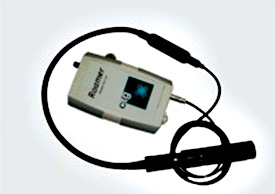Richard Burt, Sales & Marketing Director, Chelsea Technologies Group addressed the Fifth Intergovernmental Oceanographic Commission Global Conference on Oceans, Coasts and Islands on the future of oceanographic sensors and technology and shared his vision of future developments.
In a session to commemorate the 50th anniversary of the IOC, Richard outlined that oceanographic instrumentation has traditionally been developed within academic centres of excellence in order to provide answers to challenging scientific questions. There are many examples of industry working with scientists to commercialise these technologies and make them available on a global scale, such as the Chelsea AQUAshuttle and SeaSoar towed oceanographic vehicles.
 Chelsea’s new range of high performance miniature Lux fluorimeters has been developed as a low cost solution for environmental monitoring.
Chelsea’s new range of high performance miniature Lux fluorimeters has been developed as a low cost solution for environmental monitoring.
Richard went on to say that environmental sensors can be categorized as measuring physical, chemical, or biological properties. Physical sensor technologies are the most mature, with well-established field-deployable sensors for a number of oceanographic parameters such as temperature, pressure, salinity, light and turbidity. However, there exists only limited capabilities for field-deployable chemical sensors (e.g., dissolved oxygen, pH, redox state) and biological sensors to provide key information on the production, structure, and composition of biologically influenced ecosystems in real time.
The need to provide long term data sets in support of environmental monitoring and climate change science is now dominating the technology requirements. Chelsea’s new range of high performance miniature Lux fluorimeters - UniLux and TriLux – have been developed as a low cost solution to meet these requirements. Similarly, the Chelsea Fast Repetition Rate Fluorimeter is fast becoming the tool of choice for a range of organizations wishing to investigate the physiological responses of a diverse range of phytoplankton within ocean, coastal and fresh waters.
Long term observing systems are becoming widely established and the diverse range of oceanographic environments requires careful selection of appropriate sensor technologies. It is becoming increasingly important to identify where technology gaps exist and to ensure that clear guidance is provided to scientists and industry to enable these to be addressed.
The recently established SCOR OceanScope working group highlights the need to utilise commercial vessels on a large scale to undertake detailed water column measurements. FerryBox systems (such as Chelsea’s AquaLine FerryBox System) are a well established method of obtaining surface water data from ferries and ships but systems for unattended, detailed water column profiles will present new technology challenges.
These are global challenges and the Intergovernmental Oceanographic Commission (IOC) is ideally placed to provide an important identification and coordinating role.